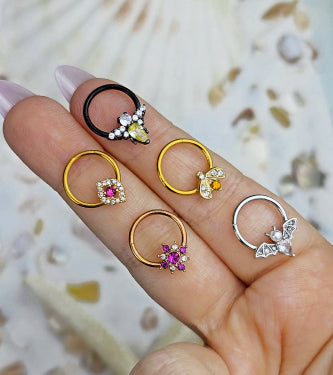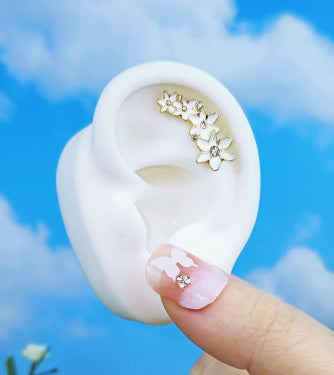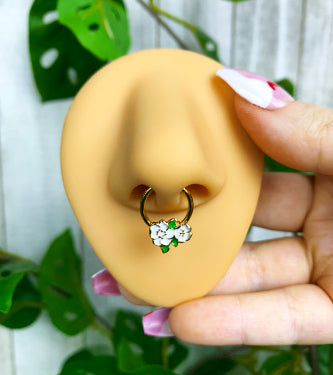Visible facial piercings are becoming more and more accepted as the face of our culture changes. Do you love the look of a labret piercing but want something a little bit less common? Do you have a labret or other facial piercings and want to embellish them with an even more unique piercing? Then the lowbret piercing might be just what you are looking for. No, it’s not just a misspelling of the word labret, it is a very different piercing. A labret is a piercing located under the center of your lower lip. You can wear a labret stud or a lippy loop labret, a piece of jewelry that comes out of the labret and loops up over your lip, in it. The lowbret piercing is a horizontal labret piercing that is placed as low as possible under the lip; it passes through the pocket that is above the tissue that attaches your lower lip to the bottom of your gums. For this piercing the piercer goes as far down as possible without reaching the chin cartilage. A labret stud is the jewelry most often used.
The lowbret piercing can be positioned in the center, left, or right. A lowbret can be centered like a labret, or can be pierced two or three times along this lower gum line. It is pierced horizontally so that the jewelry protrudes directly out, or it can be angled downward so that a long spike can be worn. Jewelry for this piercing is 16 or 14 gauge labret stud, which is longer for the initial piercing to allow for swelling. The stud has a shaft with a flat disc backing on one side, to be worn in the mouth, and a round bead or decoration on the other, to be worn on the surface of the face.
A popular grouping of piercings is a labret with a lowbret on either side. I think it looks very visually appealing to have the sort of pierced triangle that is created with these piercings on the chin. I’ve also seen multiple lowbret piercings going up the jaw line which also looks really cool. Although it is a beautiful and internet-popular piercing, some piercers will not even attempt the lowbret. It’s a fairly new piercing that is very tricky to place correctly, and whether a person can even get it or not is specific to their anatomy.
The procedure goes as follows: your piercer will mark the spots on your chin or lower lip. After your final approval of placement, the area is clamped to pull the lip away from the jaw. The hollow 16 or 14 gauge needle is then passed through the flesh and the labret stud is inserted and secured to complete your new piercing. Piercing from the inside part of the mouth to the outer skin is considered close to painless according to most piercers.
Another variation of the lowbret piercing is the vertical lowbret, it is placed vertically inside the mouth and pierced as low as possible in the space above where your lip and gums connect. It is pierced through the cheek and emerges near the jaw line. The vertical lowbret goes through the lower part of the cheek and comes out in the mouth directly beside the jaw bone near your teeth. The barbell for this piercing is much longer, over an inch long at least, to fit comfortably and not restrict facial movement. Vertical lowbrets look great in a pair, placed symmetrically on either side of the face. A combination of vertical and horizontal lowbret piercings would give your face a very interesting look.
It is extremely important to have an experienced, professional piercer that understands anatomy to complete your body modification. If a piercing is done incorrectly, pain, infection, migration, and expulsion are concerns. However, even the most perfectly pierced lowbret piercings run the risk of damaging your teeth or gums. If improper jewelry is worn, the flat disk on the back of the stud jewelry can rub on your gums or scratch you teeth, causing gum recession and possibly tooth damage. During the healing time you absolutely shouldn’t play with this piercing, to lessen the chances of migration or infection. (Plus, manipulation of the jewelry while the piercing is fresh can cause more damage and pain than the actual act of piercing it.) Following proper aftercare methods will heighten the chances of the piercing’s long term survival.
This piercing is both a facial and an oral piercing, meaning you have to care for it accordingly. Aftercare of the lowbret piercing is very similar to that of the labret piercing. It is often recommended to do saline soaks and as always to follow the very specific instructions given to you by your professional piercer. With proper aftercare, healing time takes about 4 weeks or so. As with any oral piercing, avoiding alcohol, tobacco, sticky food, and following other dietary restrictions are generally recommended to keep your piercing healthy.







